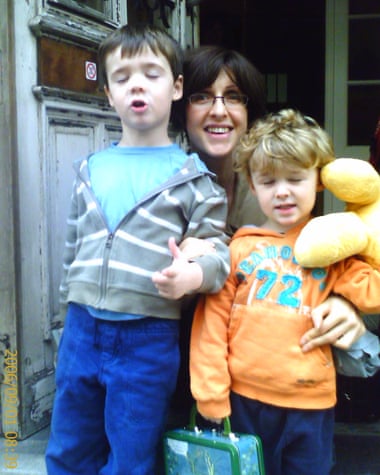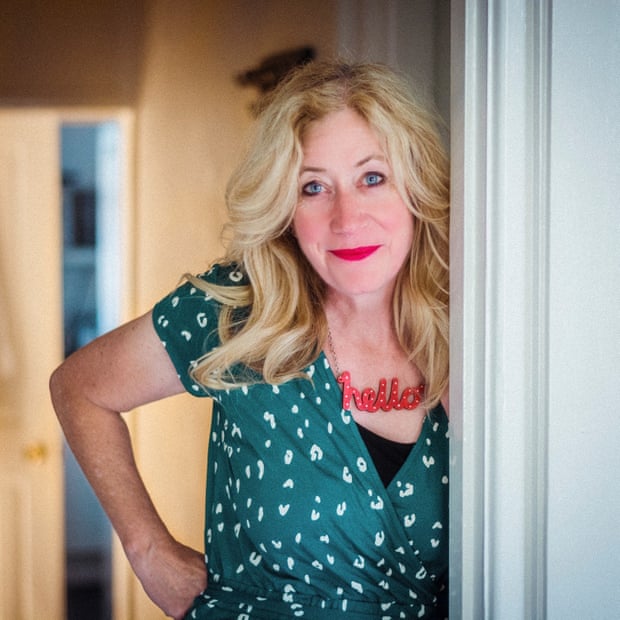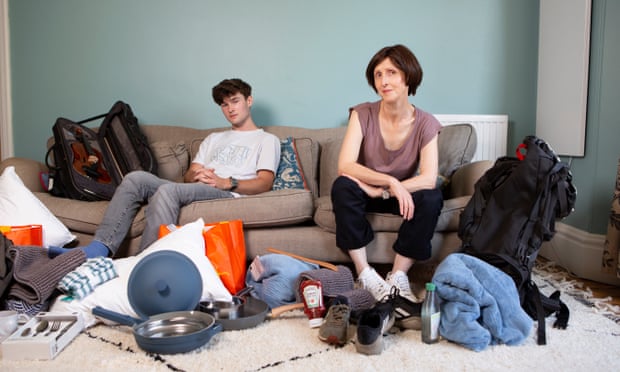‘It struck me like a thunderbolt’: how to survive empty-nest syndrome – and come out smiling | Parents and parenting
Signs of seasonal migration are everywhere in the university town where I live: double-parked cars, warning lights flashing, occupants emptying jam-packed boots; bright flocks of Ikea bags, plump with pillows, extension leads trailing. Later in the day there’s another migratory wave: pink-eyed parents, heading back to empty homes with quiet kitchens and unmolested fridges.
This weekend I’ll be joining the migration. My son just messaged me (yes, from a few feet away) to say he has booked a moving-in slot at his hall of residence on the other side of the country. It will be my second – and last – time dropping a kid at university; his brother started last year. It’s an event both utterly ordinary and so emotionally freighted it has become a cultural moment, anxiously anticipated and amplified by celebrity interventions. Rob Lowe, Heidi Klum and Ulrika Jonsson have all described their pain. Ruth Langsford of This Morning recently told Women & Home magazine that after her son left, “for the next three days I felt like I’d had my womb ripped out … I was sitting on his bed, sniffing his pillow”. (Being left alone with Eamonn Holmes might drive many of us to something similar.) Gordon Ramsay confessed to being so bereft, he wore his son’s pants – I’m truly sorry for sharing that.
I’m not dreading it: this move feels like a happy event. It’s not that I’m desperate to get rid of my boy; he’s a laconic, low-key presence, cat-like in his discretion around the house, with a sharp wit. It has been delightful to watch this person emerge from the intense toddler whose rages I shut myself in the bathroom to avoid. But as a relatively young mother, temperamentally unsuited to the slow hours and fast years of childrearing, I have always been impatient for the next milestone. I have a sense of celebration as both my boys progress towards adulthood: I want to see who they become. And after their Covid-stunted, Gavin Williamson-blighted late teens, I’m especially excited for them to escape the stultifying cocoon of home.
I’m also excited for me, and for us. I haven’t spent more than a week alone with my husband for 20 years and I’m curious how we’ll cope. Back then, we wore suits to work, rode a Vespa and had a fatal penchant for relationship drama, conjuring fights out of thin air. We’ve mainly bottled all that up for two decades. Will we fall back into old bad habits? (I hope not: my back can’t cope with sulk-sleeping in the bath now.) What will we talk about? Will we ever eat at a table again? Who will we become?
Current indications suggest I’ll become a sexless shut-in hobbit, shouting into hedges about biodiversity, pockets full of worms for an expanding menagerie of rescued birds. Bafflingly, my husband recently bid on a pottery kiln “in case I ever want to make an ashtray”, despite never expressing an interest in ceramics, or smoking. I asked him how he was feeling about our emptying nest, in an attempt to forge some emotional glasnost. “Is this for work?” he said suspiciously, then claimed he didn’t know yet, while continuing to barbecue ceaselessly, in anticipation of the other household carnivore leaving. He even asked me to “probe his meat”, without the slightest erotic overtone. I feel we’re both ready to sink into shambolic eccentricity.
But are we in for the shock of our lives? Dating coach and single parent Kate Mansfield’s son left home in February. They had a loving but fraught relationship through years of home schooling and Covid lockdowns; her sociable son filled the house with gangs of mates who emptied her fridge in the small hours. “I had slightly resigned myself to thinking he would be here until he was in his 40s, then he suddenly said: ‘I’ve found a flat and I’m moving out next week.’ I had had a sort of long-running fantasy at the back of my mind that one day this would end – then it happened and I was devastated.” Rae Radford, a social media influencer from Kent, had a similar experience. “I honestly thought I’d be thrilled to see the back of my ungrateful sons who treated my home like a hotel, but after dropping them off at university, the truth struck me like a thunderbolt.”

Fiona Esom felt prepared when her son and daughter left – she was busy with her Fairtrade cocoa business Food Thoughts. “I thought all is as it should be; I was expecting this.” Then her dog died. “I can laugh at it now,” she says. “‘When did you go downhill?’ ‘When the dog died.’ But he had bridged the gap with my mother’s death, me leaving my marriage, bringing my children up. It was like everything was ending in one go. I wasn’t prepared for the grief I felt.”
It’s not just women (though interestingly, men are more anxious to be anonymous). It hit Ben (not his real name) as he drove his youngest son from Ireland to the UK to study. “The day before I was fine. But as I was driving along, I realised I was driving my son away. I could barely speak to him; I was overcome.” His emotion is palpable over the phone as we speak. “I still think he’s in the house. I still think he’ll come out of his room, then it hits me: no, he’s gone.” The house is quiet and empty. “It’s like someone turned off the music,” he says, breaking my heart a bit.
Why does this “predictable event in the family life cycle”, as family therapist and Association for Family Therapy member Dr Ged Smith calls it, ambush us? There’s a good chance, Smith says, that a “perfect storm of crises” phenomenon is at play. “It will coincide with other things – you’ll probably be at an age when you’re also questioning your relationship, your job, your career – your life, really. Thinking: ‘What now? Is this it? Is this the job I want? Is this the person I want to stay with?’”
Certainly a profoundly shaken sense of identity comes back again and again as you speak to empty-nesters. “It was the end of what you’ve put all your energies into, and you know you’ve done a good job, but you have to face up to: ‘Well, who am I? What am I? What am I for?’” says Esom. “You were a parent your whole life, you had this job and this focus. It’s a huge part of your life, and personally I loved it – it wasn’t a burden,” says Ben. “What do I do now? What am I doing this for?”
“I couldn’t place myself any more,” says Michelle Lancaster, a graphic designer and illustrator whose two daughters left almost simultaneously. “I didn’t know who I was or who I should be.”

Part of learning who we are now is recalibrating relationships with our absent kids after years of in-person parenting. That course correction can be painful. A friend whose daughter has struggled with an eating disorder is terrified how she’ll cope with relapses. Another parent says: “This is a child who can’t pick up his pants … And of course, he’s going to be stoned within the first week.”
Ben fears his son will find his chosen career mercilessly competitive. “I think he’s going to realise how hard it is.” He also wishes he had taught his son how to wire a plug. “Why didn’t I do that?” For me, the knowledge I hated university (I was lonely, sad, often desperate), but didn’t breathe a word to my parents, hangs over me as I wonder if I should follow up an unanswered WhatsApp message.
It’s important, Smith says, to “establish healthy contact with them”. He suggests talking about it directly. “Perhaps like: ‘I’m going to miss you when you go, but I’ll be OK. How much contact would you like me to have with you?’” He’s reluctant to give advice, but gets emphatic on this: “Don’t make your child worry about you. Don’t say to your child: ‘You know, since you’ve left, I’ve been very depressed; me and your father fight all the time.’ Don’t do that – even if it’s true!”
While he’s on an advice roll, I slip in a question about my chief fear: that it’s too late and our relationships are fixed now. Esom says she knew she had done a good job; I’m not so sure and the mistakes I made now feel irreparable. Did my concern to give my sons space and privacy feel like a lack of love? Will they only remember that time I smashed a bottle in a rage? You know, the usual 4am thoughts. Smith’s own relationship with his four kids is, he reassures me, “constantly evolving”; he suggests solo breaks with my boys over the next few years might help. It won’t stop the 4am self-flagellation, but it gives me something practical to plan.
What about your relationship with your partner, if you have one? “Check the statistics on divorces,” someone advises me, darkly. “You’ll look at the bloke you’ve made these kids with and go: ‘You’re just an arsehole – why have I stuck with you for so long?’” I do check the figures: “silver splitters” are a growing phenomenon, according to the Office for National Statistics. And what if you react very differently to this new phase: one bereft, the other excited? “Pay attention to each other’s difference,” advises Smith. “Make an effort to understand; don’t just argue with them or try to convert them to your way of thinking.”
At the risk of tempting fate, I’m hopeful. My husband’s cheery dynamism is a good foil to my solitary, joyless tendencies. His salad-making is an affront to God (cheese rind everywhere; tinned corn; aggressive quantities of vinegar) and he falls asleep on the sofa at 8pm like clockwork, but I can’t imagine sharing a threadbare nest with anyone else. When our sons went away recently, he joined me in a nature reserve hide to look at some distant ducks, even suggesting we could “come back early one morning with a Thermos of coffee”. I’ve rarely heard anything so romantic.

For those struggling, it does get better. For Mansfield it was important to “allow myself to feel the feelings. I had a couple of weeks of crying and feeling sad and missing him.” Focusing on the positives helped (“I can have cheese and wine for my dinner every night”). After all, living with teenagers is famously not a “good vibes only” experience. “They just become arseholes, don’t they – there’s no way around it,” says Radford. But then the cooking, laundry, mess and drama all stop, which is the definition of a mixed blessing, I think. As Ben says: “Those things you hated about them, like being untidy, you realise all of that was kind of a privilege.”
“It’s a healthy thing, isn’t it?” muses Smith. “A healthy family is one that prepares the children to grow up, become self-sufficient and leave. You should spend the whole of your kids’ life preparing them for the very thing that’s going to do your head in.”
I’m reminded, too, that not every parent gets to experience an empty nest. Alice (not her real name) has a disabled son who will never be able to live independently. She grieved when her eldest daughter left home (“I cried at work; I kept putting out her place at dinner, then cried the day I didn’t put her place out”), but also feels deep sadness that her son will not get that same experience. She and her husband didn’t get the “empty-nest bonus other parents get – taking off for the weekend on a whim. That is a disappointment.”
For us lucky ones, after the initial shock comes the great “What now?” That’s where things get interesting. For Esom, it meant welcoming a Ukrainian single mother and daughter into her newly empty home for three months. “The children did point out the irony: ‘Hey, Mum, you’ve just stopped having to care for us and now you’re bringing in other people to care for!’ It was a valid observation.” But it was, she says, “fabulous for all of us – delightful and interesting”. Mansfield let out her flat and took a solo road trip across the US, including a week of equine therapy and business meetings in Las Vegas. Radford moved to the coast, left her marriage and acquired four dogs (“one for each child”). Lancaster moved to the seaside, too, taking up surfing and dating. “I’m just taking myself for adventures, I’m putting a flask in my backpack, taking the dog and going off exploring. There are no compromises.” Her girls are thrilled to see her happy. “They didn’t want me to be sad and lonely. I’m actually having more of a high time than they are!”
Or how about this for an empty-nest curveball: one friend was “ready and excited” when her daughters left home, but soon afterwards got back together with a former partner who has a 13-year-old from another relationship. “Five more years of parenting before I can have that empty nest back!”
Learning to put yourself first again means working out who you are, and that throws up tough existential questions. The answers can be surprising, painful, exhilarating, even wonderful. “I’ve had an amazing life in comparison to what I had, because I was brave enough to put my big girl knickers on and think: ‘I’m not putting up with this,’” says Radford. “Absolutely embrace it,” urges Lancaster. “Because it does get better – I’m the happiest I’ve ever been.” We’re starting our empty-nest life by leaving it: we’ve booked a trip to Italy, and I’m not packing my sons’ pants.